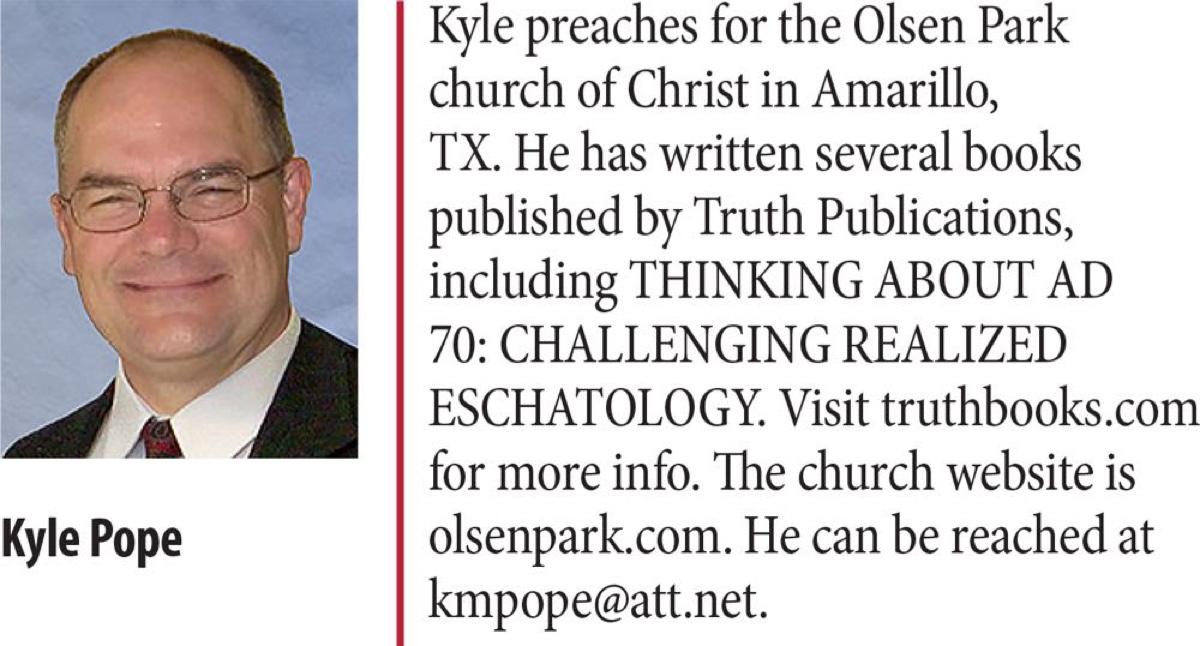By Kyle Pope
Synopsis: Kyle Pope has done a two-hour video responding to a twenty-one-video review of his book on the AD 70 Doctrine. This article summarizes the material and directs the reader to resources for further study.
The AD 70 Doctrine, also known as realized eschatology, or full preterism, teaches that everything prophesied about end times has already happened. I wrote a book in 2019 entitled Thinking about AD 70: Challenging Realized Eschatology. In 2021, one of the most prominent spokesmen for this view, Don K. Preston, devoted twenty-one videos to a review and attempted refutation of my book. I have produced a two-hour video answering his ten hours of videos that is posted on our church website. In this article, I would like to address some highlights. To study this further, please see the resources at the end of this essay.
For the AD 70 Doctrine to be true, its proponents must argue that Mosaic law did not end at the cross, but when Jerusalem was destroyed in AD 70. Preston makes the argument that, if the Law of Moses ended at the cross, then nothing it prophesied could have awaited fulfillment. This is a seriously flawed argument. Genesis 49:10, which was revealed before Mosaic law, prophesied “the obedience of the people” under Jesus. Does that mean patriarchal law is still in force, since this is still being fulfilled? Of course not! When one law supersedes another, it becomes what defines sin and righteousness. The Old Testament continued to have value after the cross “for our learning” (Rom. 15:4), but it was no longer the standard that determined sinful and righteous behavior (Rom. 10:4; Heb. 10:9b; 1 Cor. 9:21; Gal. 6:16; Rom. 9:6; 2:28-29; Gal. 3:7, 28-29).
A skewed interpretation of 1 Corinthians 15:56 leads full preterists to argue that Mosaic Law would continue until Jesus’s coming and the resurrection (which they argue took place in AD 70). This text comes in a chapter on resurrection, and in a section that describes resurrection, as a time when the righteous have “put on” incorruption and immortality when death has been “swallowed up” (1 Cor. 15:54-57). If this has already happened, then death has already been “destroyed” (15:26)—yet people still die physically and spiritually. I challenge Preston to recognize that, with his rationale, logically he must accept: (1) universalism, and say all are saved; (2) “Once saved, always saved,” a core tenet of the false doctrine of Calvinism, or (3) minimize the force of what Paul says. The AD 70 Doctrine minimizes or rationalizes away many clear promises of Scripture.
Their argument from 15:56 is that, if death was conquered in AD 70, and the sting of death is sin, and the strength of sin is “the law,” it must mean “the law” ended in AD 70. So, Preston throws out a common full preterist charge: “Mr. Pope believes the gospel is the strength of sin!” That inflammatory accusation misses many things. First, it assumes that “the end” (15:24) is AD 70, which cannot be proven from the context. Second, it minimizes the force of putting on “incorruption” and “immortality.” Third, it assumes the phrase “the law” refers specifically to Mosaic Law (or the Law of Christ) rather than the principle that God’s law generally sets forth a sin-to-death consequence. Yes, the gospel of Christ now defines sin (John 12:47-48; Acts 17:30-31; 2 Thess. 1:8), but it also offers the means ultimately to overcome the sin-to-death principle by the blood of Christ—something to which Mosaic Law could only look forward.
Throughout the videos Preston accused me of committing a linguistic fallacy called the illegitimate totality transfer fallacy (ITTF), defined extensively by Old Testament Scholar James Barr. This practice assumes that all possible meanings of a word must apply any time it is used. He raised this charge many times whenever I called upon the reader to consider the broad conceptual basis of words upon which full preterists have imposed narrow and subjective meanings. Ironically, Preston misapplies the definition of this fallacy, ignores instances in which he is far closer to committing it than I am, and seems blind to the fact that the AD 70 Doctrine itself relies upon a method of taking words and phrases from remote and distinct contexts and demanding they mean the same thing in every use in Scripture.
A blatant example of this is in Preston’s teaching on the Greek word stoicheia. In the book, I consider the many instances of its use in Scripture and demonstrate how the context shows that it means different things in different contexts. For the AD 70 Doctrine to be true, Preston must argue that Peter’s promise of heaven and earth being “burned up” cannot apply to the material universe, but to the melting of the “elements (stoicheia)” (2 Pet. 3:10, 12) of the Jewish system. I show that, in the context, Peter begins with a reference to God’s creation of heaven and earth “standing out of water and in the water” (3:5), the world of the flood that perished “with water” (3:6), and the present heavens and earth being “reserved for fire” (3:7). In each case, it is the material universe that is being discussed. Only three verses later, it is the “elements” of this same material universe that Peter says will be burned up. Despite this, Preston argues every use of stoicheia in the NT refers to the elements of the Jewish system. This interpretation ignores context and is far closer to committing ITTF than any of my arguments.
This tendency to dismiss context and distinctive wording characterizes Preston’s approach to Scripture. He argues that Genesis 8:21b-22 is a promise never to destroy the earth in any way. We have just noticed Peter’s contrast of the flood’s destruction “with water” (2 Pet. 3:6), and the future destruction that is “reserved for fire” (2 Pet. 3:7). That explains the Lord’s qualification in Genesis 8:21b, that He would not destroy it “as I have done.” Preston mocks this distinction and says it makes God more concerned with “method than mercy.” That is a subjective appeal to emotionalism, not an exegesis of the text. If 2 Peter is consistently talking about the material creation, it is inescapably promising destruction by fire of that same material creation. Appeals to an emotional response to that reality do not change what it says.
The AD 70 Doctrine leads people to become so convinced they have unlocked a hidden key to knowledge that has eluded lesser minds that they accept concepts which are radically heretical with little hesitation. For example, Preston argues that Isaiah 27:9 (despite a context that points to 587 BC rather than AD 70) teaches that the Roman destruction of Jerusalem accomplished atonement for sin! The NT teaches that, on this side of the cross, Christ’s blood is the only atonement for sin (Heb. 10:12, 26; 1 John 2:2).
Another example is seen in Preston’s teaching on the death which Jesus died on our behalf. In addressing points that I made in the book about 1 Corinthians 15:20, Preston denied that describing Jesus as “the firstfruits of those who have fallen asleep” (1 Cor. 15:20) shows a correlation between His bodily resurrection and the future bodily resurrection of the righteous. He argued that this means Jesus was “the first to be raised from the death of Adam,” going on to argue that Jesus spiritually died! Preston likely does not realize that with such arguments he embraces the Calvinistic false doctrine of imputation. If Christ died spiritually (i.e., He was separated from God) in any literal sense, He either stopped being God or there were two Gods for a time. If He literally became guilty of sin, He would not be a “lamb without blemish and without spot” (1 Pet. 1:10).
To argue that Daniel 12:2 (one of the most explicit descriptions of resurrection in the OT) happened in AD 70, Preston tries to equate Daniel 12:1b and Jesus’s promise of tribulation in Matthew 24:21 and Mark 13:19. Once again, he ignores the context and also dismisses the distinctive wording in the two texts. While the context is talking about the persecution of the Jews under the Greeks, he argues that persecution was not the worst “since there was a nation.” In my video, and in my article in last month’s Truth Magazine, I refute this by considering the scope of this horrible attempt to exterminate Jewish faith (“Since There Was a Nation” 66.3 [Mar. 2022]: 6-7).
Preston makes an odd argument that appeals to false doctrines in the NT to argue that they demonstrate the nature of sound doctrine. In addressing points I have made about 2 Timothy 2:17-18 and 2 Thessalonians 2:1-2, he argues: if the resurrection and Christ’s coming is to be an “earth burning, time-ending event” and “a personal, literal, visible, bodily coming,” how would it be possible for anyone to believe or convince others it had already occurred? This is like saying, “if baptism really was immersion, how could anyone ever come to believe that it was sprinkling or pouring?” The nature of false doctrine proves nothing about sound doctrine. I urge him to consider, instead, how these false doctrines parallel exactly the skewed teachings of modern-day full preterism.
For realized eschatology to be true, all cosmological apocalyptic language must apply only to the event with which it was first associated. It can have no dual meaning or literal application to any future events. They argue that it is only figurative “exaggeration.” On the other hand, they apply very subjective and narrow interpretations to time statements, which they arbitrarily restrict to fulfillments within the generation to which they were first spoken.
Does God exaggerate? In Numbers 23:19 the Holy Spirit reveals: “God is not a man, that He should lie, nor a son of man, that He should repent. Has He said, and will He not do? Or has He spoken, and will He not make it good?” If apocalyptic language foreshadows ultimate literal fulfillments, God is honest—a figurative fulfillment anticipates making good what He has spoken. If it is all just “exaggeration,” God has lied. How, then, can we trust anything that He has said?
Preston argues that this exaggeration is just the manner of speech of the prophets and this is how it would have been understood by first-century Jews and Christians. When evidence is offered showing that Jews and Christians expected a literal fulfillment, he then says, yes, but they were wrong. He even asserts that the “biblical principle” is always that the literal comes first, and then the figurative. That is not true of Joseph and Pharaoh’s dreams (Gen. 37:5-10; 41:1-8) and it is not true simply because man calls something a “biblical principle.”
With little or no explanation, Preston often quotes passages that are usually translated “will be” and renders them “is about to be.” He does this because of his preferred definition of the Greek word mellō, which can mean “about to be” but most frequently means simply “shall, should, would, will.” Preston imposes this narrow meaning in passages like Acts 24:15 to make Paul say, “there is about to be [mellō] a resurrection of the just and the unjust” (YLT). I challenge him to consider its use in Acts 26:22-23. Will he apply this narrow meaning to that text, where Paul says “the prophets and Moses” said Christ was “about to [mellō] come” and “about to [mellō] proclaim light” (YLT)? If it can apply to something that would not happen for centuries in Acts 26:22-23, why can’t it apply to centuries in Acts 24:15?
When Preston did his videos, he was in the midst of a written debate on the date of Revelation, so he offered only a few comments. Appealing to the Song of Moses, Preston argued that its reference to avenging “the blood of His servants” (Deut. 32:43) is a specific prophecy fulfilled in Revelation 19:2, which also speaks of avenging “the blood of His servants.” I make the argument that the Song of Moses was a general “witness” to Israel throughout its history, not a specific prophecy pointing to AD 70 (Deut. 31:19). I point out that 2 Kings 9:7 echoes the wording of the Song of Moses just as closely (if not closer) than Revelation 19:2, but Preston does not treat it as specific fulfillment. Why not? Preston appeared to disagree with evidence that Domitian, the emperor most believe to be reigning when Revelation was written, insisted on being worshipped as a God. If he is, he is disagreeing with ancient writers. Both Suetonius and Dio Cassius claim that he did (Suetonius, Domitian 13.2; Cassius Dio, Roman History 67.4.7). Preston criticized me for offering evidence in the book that Rome, and not Jerusalem, was known as a city set on seven hills (cf. Rev. 17:9). He asserted that, “no preterists believe that this was Jerusalem!” While he certainly knows more about full preterism than do I, he is wrong about this. I have personally heard full preterists make this argument. Finally, he tries to equate the “great city” spiritually called “Sodom and Egypt” (Rev. 11:8) with “Babylon the Great” (Rev. 17:5; 18:2), concluding that it is physical Jerusalem since the first is called the place “where our Lord was crucified” (11:8). This argument presumes the Holy Spirit is talking about the same place—a view I reject. It also assumes the temple (11:1-2) refers to the physical temple rather than the spiritual temple of God’s people (cf. Rev. 3:12)—which is an odd view for a doctrine that spiritualizes virtually everything!
I was honored that Preston found my material worth devoting so much time to it, but I wish he had been more careful in his reading of it. For example, I included an appendix in the book from a lecture I did for a preacher’s study on eschatology in Ezekiel. In his reviews, Preston falsely claimed that I teach that Ezekiel 32 was about final judgment. In the book, I consider what the chapter teaches about Sheol as a conscious state awaiting final judgment. He falsely claimed that I teach that the valley of dry bones vision in Ezekiel 37 describes the final judgment. In the book, I explicitly state that it does not—even listing it in a section entitled “Spiritual Resurrections.” To assume I believe things I do not, then argue against his own assumptions, is not productive.
While addressing points I discussed in the book about Christ’s fulfillment of the Law, Preston made more false claims about my views, then argued against things I have never taught. In discussing Matthew 5:17, I offered “at least two ways” that Christ fulfilled the Law: (1) He fulfilled what was spoken about Him, and (2) He “established” or empowered the Law to accomplish its purpose. Preston ignored my explanations and falsely claimed that I teach that Jesus only brought “some moral fulfillment,” or the “spirit of the OT.” That is not true, as careful readers can verify. After disagreeing with my teaching in virtually every video that the Law ended at the cross, in addressing my treatment of Matthew 5:18, Preston made the ludicrous charge that I teach that the OT remains in place until the end of the material universe. His view assumes “heaven and earth” refers to the Jewish OT system, ignores that its parallel in Luke 16:17 describes the enduring nature of God’s word, and refuses to consider any sense in which the phrase, “the law,” envisions the fulfillment and establishment of the perfect law in the Law of Christ.
I tried in the video to be as kind and objective as possible. Since Preston was formerly associated with churches of Christ, I appealed to him as an erring brother to reevaluate his faulty conclusions and turn, in truth, to what the gospel teaches (2 Thess. 3:15). This doctrine has a history of many who once embraced it later coming to recognize its erroneous teaching and rejecting it. I pray that Preston, and any who have been ensnared by its flawed and heretical doctrines, will do the same.
Preston’s series may be viewed on YouTube: MrDonPreston, playlist “Responding to Kyle Pope:” Review and Response to Kyle Pope’s Book-Thinking About AD 70-#1 - YouTube
There are twenty-one posted videos, but only twenty actual reviews. Number ten was recorded twice with no difference in content. My video response and written material can be accessed here: Answering Don K. Preston or on the Facebook page of the Olsen Park church of Christ.
For those unfamiliar with this strange doctrine, a summary is offered at the beginning of my video and in the written material. My book, Thinking about AD 70: Challenging Realized Eschatology. (Athens, AL: Truth Publications, Inc., 2019), although not exhaustive, addresses it in greater detail.
In 2020, Olsen Park church of Christ hosted a debate on this issue. The videos are available online: 2020 Debate on the AD 70 Doctrine and a transcription of the debate has been published (Will Jesus Really Come Again?: Reeves-Neubauer Debate on the AD 70 Doctrine, Athens, AL: Truth Publications, Inc., 2021).
Before the debate, I preached a four-part series on the AD 70 Doctrine available here: Series on the AD 70 Doctrine
To read more about the illegitimate totality transfer fallacy (ITTF) see James Barr, The Semantics of Biblical Language. (Oxford: Oxford University Press, 1961 and Daniel B. Wallace, “Lexical Fallacies by Linguists” danielbwallace.com (Dec. 2014) https://danielbwallace.com/tag/diachronic/. diachronic—Daniel B. Wallace


